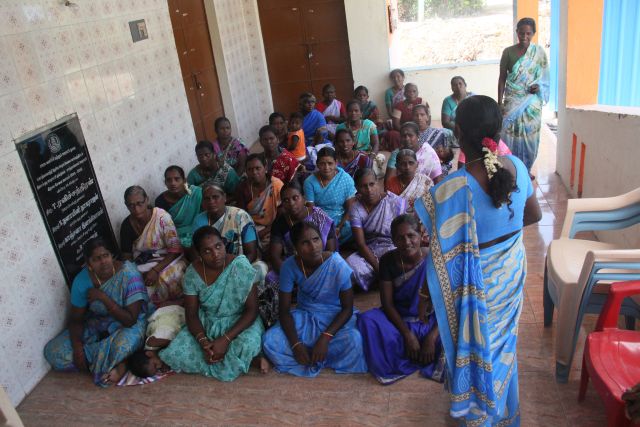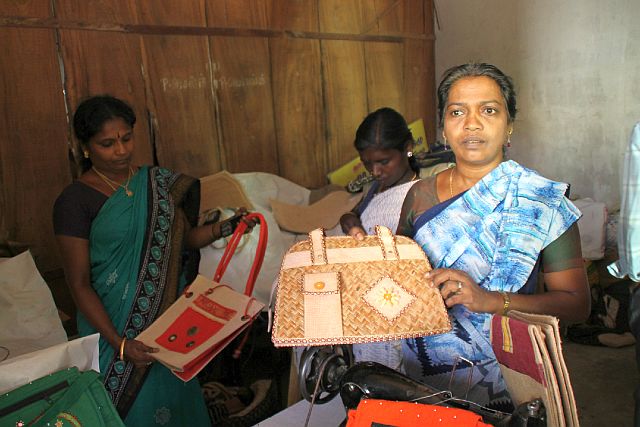Our Achievements
Resourceful Women

The general objective of the project is to contribute to the social and economic empowerment of women in rural South India.
A Self-Help Group (SHG) is formed by 12 to 20 women who decide to pull together their resources in order to maximize their economic resources and incomes. Thus, the program
encourages the creation of economic activities by providing women the necessary support to develop income generating activities.
The women participate to several training impart them vocational skills and train them to self-manage their economic activity. The training enable them to reinforce their capacities and to gain qualifications which can directly be applied to their activities.
By pooling their resources together, the women gathered in SHG have access to subsidized micro-credits with preferential rates as the government wishes to facilitate the development of economic activities.
The program “Resourceful Women” also aims to address social problematic which affect
women in rural areas. Awareness campaigns and dedicated training are organized to
discuss the taboos and prejudices which persist against women in Indian society. The
discussion groups are usually organized on special occasions, such as International Women’s day, to encourage women to be active in politics.
Casa Foundation helps in raising funds for the project and plays a role of intermediary between the donor of the project and SEVAI. We also provides tools to SEVAI to improve the follow-up and evaluation of the project and is also in charge of the reports for the donor.
The project is implemented in Tamil Nadu, in a rural area where most families rely on the
incomes generated by agriculture. Economically isolated, the region suffers drastically from the climate change. The droughts and floods have a devastating effect on the agricultural activities of the local population.
SEVAI aims to offer new opportunities to local populations, especially for women, who
became vulnerable due to climatic conditions. Furthermore, Tamil Nadu is still a very
conservative society and women face discrimination and marginalization on various grounds. Most of the time, women are primarily defined by their social status as wives, mothers or sisters. It is difficult for them to overcome this social label as many of them are exclusively evolving within the family circle: they get married early and have a limited access to education in rural areas.
Being financially dependent on their husbands, women occupy lower economic positions
despite their contributions to the household’s income. They do not have financial autonomy since they rely almost exclusively on their husbands’ resources. Some women find themselves in very vulnerable socio-economic situation which maintain them in a vulnerable position in case of events such as the death of their spouse or disagreement with their inlaws. Various social and societal factors contribute to the elaboration of this social label. Access to education, health and political life play a major role in keeping them away from decision making positions. The government is launching programs to address those issues. However, the investments mainly target young people and the lack of information and sensitization limit the impact of those campaigns.
The beneficiaries come from the disadvantaged Dalit and Tribal communities. We focuses on the women who are socially excluded, such as widows, single mothers, prostitutes and women with disabilities. All the beneficiaries live in the district of Trichy which make it easy for them to attend the training in one of the three training centers owned by SEVAI.

Identification process of the beneficiaries
Our program partner SEVAI’s social workers travel between villages to present the organization and the SHG project. After this presentation, the women willing to participate in the program approach SEVAI and the social workers identify the eligible beneficiaries based on their motivation and on their economic status. Women are always selected on a voluntary basis. This process ensures the women’s interest in the project. It is crucial for long lasting results and for a real involvement of the population in addressing the needs of the community.

Expected Outcome
The development of an income-generating activity allows women to become independent from their husbands and / or their households. They attend a comprehensive training and awareness program that help them build-up their capacities.
On the long term, the living conditions of the beneficiaries improve, they gain in well-being, undertake and assert themselves more. Women beneficiaries are empowered so that theycan better define their position within their home, community and village.
From Solidarity to Autonomy

Casa Foundation contributes to fund and to properly follow this project. 102 Self-Help Groups (SHG) have been created so far and 126 women have been able to follow the vocational trainings (nursing, computer science and sewing).